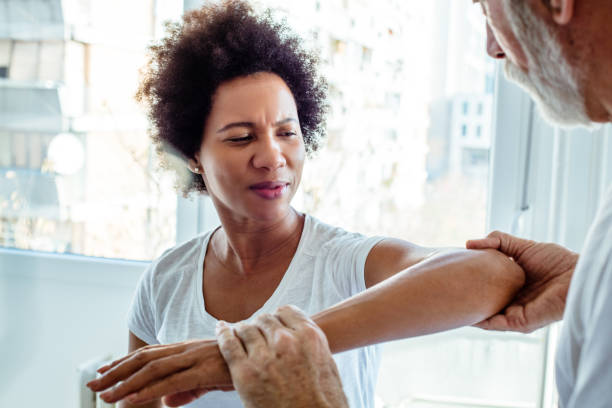Managing Arthritis in Black Women: Effective Workouts and Supplements Insights
Do your joints feel stiff and restricted in the morning or after being inactive for a while? Maybe you’ve noticed swelling, tenderness, or pain that can range from a dull ache to a sharp, stabbing pain. If these are familiar, arthritis management strategies can help you maintain your mobility and reduce pain.
Arthritis symptoms make it more difficult for you to stay active and do the things you love. Left unmanaged, arthritis may worsen and lead to reduced mobility, joint replacement surgeries, increased risk of permanent disability, and contribute to organ damage.

Let’s take a look at the arthritis workouts and supplements that can help you support your overall joint health.
How Does Arthritis Affect Your Joints?
Arthritis is often described as a condition that causes inflammation and stiffness in the joints. It can be likened to an old door with a rusty hinge. The rust makes the door hard to move and it doesn’t swing as smoothly as it used to. But instead of a door, it’s your joints – those parts of your body that allow you to bend, twist, and make the most of your day. Just like the rusty hinge on the door, arthritis can make your joints painful and less flexible. When arthritis comes into play, it wears away the cartilage in your joints. This cartilage is like a well-oiled machine, providing a smooth, lubricated surface for joint movement. Without the protective space that cartilage provides, your bones rub against each other, leading to pain, swelling, and stiffness.
What Are the Main Forms of Arthritis?
The types of arthritis are as diverse as the people it affects. The two most common types are osteoarthritis and rheumatoid arthritis. Osteoarthritis, often associated with age, primarily affects the hands, knees, and hips. On the other hand, rheumatoid arthritis is an autoimmune disorder where your immune system mistakenly attacks your own body’s tissues, primarily affecting the lining of the joints. Each type has its unique symptoms and treatment methods, but both can significantly impact quality of life if not managed effectively.
What Should You Know About Arthritis and Black Women?
Arthritis is a major health issue for Black women in America, with a consistent increase in the number of Black women over the age of 65 diagnosed with arthritis. However, research indicates that Black women are more likely to mistake arthritis pain and symptoms for a normal part of aging. This perception often results in delayed treatment, which can worsen the condition. Cultural beliefs and attitudes toward pain can influence this acceptance. For example, the notion of enduring pain as a sign of strength is common in some communities. Furthermore, worries about medication side effects and a lack of trust in healthcare providers can also contribute to this trend.
What Arthritis Symptoms Should You Look For?
Symptoms of Arthritis include joint pain, stiffness, swelling, and reduced range of motion. Some people also experience fatigue and muscle weakness. It's important to consult with a healthcare professional for an accurate diagnosis and personalized treatment plan. Early identification of arthritis symptoms is important because it makes it easier for you to manage the condition and gives you the opportunity to slow the progression of joint damage.

Tips to Manage Arthritis Symptoms
- Gentle Exercising: Exercises like Walking, Yoga, Water Aerobics or Swimming, and even Tai Chi, can aid in strengthening muscles, enhancing flexibility, and promoting cardiovascular health. These exercises are gentle on the joints, while simultaneously providing resistance that helps build muscle strength. Making regular physical activity a habit also helps you maintain a healthy weight so you can reduce the strain on weight-bearing joints like your knees and hips.
- Healthy Diet: Consuming a diet rich in fruits, vegetables, lean proteins, and whole grains can help manage weight and reduce inflammation. Foods rich in omega-3 fatty acids, like fish and walnuts, are essential.
- Maintain a Healthy Weight: Obesity puts additional pressure on your joints, especially your knees, hips, and feet. Maintaining a healthy weight can alleviate this pressure and reduce pain while reducing your risk of severe joint damage over time.
- Avoid Repetitive Strain: Repeated motions or overuse of a joint can lead to arthritis flare-ups. If your job or hobby involves such movements, take regular breaks and use protective equipment if available. Taking over-the-counter pain relievers like ibuprofen or naproxen may provide short-term pain relief, but be careful to use these as directed to avoid side effects.
- No Smoking: Smoking can cause stress on connective tissues, leading to more arthritis pain.
- Regular Check-ups: Regular medical check-ups can help detect arthritis early. The sooner it's detected, the sooner treatment can begin, potentially slowing the progression of the disease. Having regular consultations with a rheumatologist, physical therapist, or occupational therapist can provide you with an arthritis treatment plan and interventions that are personalized to improve your well-being and maintain joint function. These may include physical therapy, acupuncture, weight loss plans, or pain medications.
Can Supplements also Help Manage Arthritis Symptoms?
Absolutely! While there is no cure for arthritis, certain supplements have shown promise in managing symptoms and improving joint health. Glucosamine and chondroitin are commonly used supplements that may help reduce pain and improve joint function in osteoarthritis. Omega-3 fatty acids, found in fish oil supplements, have anti-inflammatory properties that can benefit both osteoarthritis and rheumatoid arthritis. Collagen is also a protein that helps keep our connective tissues, like our joints, sturdy and healthy. But as we get older, our bodies don’t produce as much collagen, and the quality isn’t as great as when we were younger. That’s where the BGV Collagen Peptide Powder comes in. It helps fix joint cartilage damaged by arthritis. Research has shown that collagen supplements could be beneficial for osteoarthritis and bone health. Therefore, a regular intake of collagen will promote better joint movement and flexibility, and help manage your arthritis symptoms.
Remember, supplements should complement a comprehensive treatment plan that includes exercise, medication, and other therapies. It's essential to take a holistic approach to managing arthritis and prioritize self-care. Supplements like Vitamin D3, can provide essential nutrients that support joint health, reduce inflammation, and alleviate pain. It's important to note that supplements may not work for everyone, and it's always best to consult with a healthcare professional before starting any new regimen. They can provide personalized recommendations based on your specific condition and medical history.
What Are Some Relief Strategies for Joints?
Managing your joint discomfort and symptoms works best if you identify the problem early and develop a multifaceted approach based on a strong understanding of the condition. Self-management can involve adopting a variety of lifestyle changes. Gentle exercises and a healthy diet will support your goals.
Avoiding repetitive strain on affected joints can also preserve your mobility and improve your response to treatment, as can quitting smoking habits that worsen or accelerate painful joint symptoms.
Regular checkups with your healthcare professionals and supporting your general health with quality supplements like omega-3 and collagen can provide additional support for your joint health and overall comfort.
Depending upon your needs, your doctor may also recommend pain relievers like nonsteroidal anti-inflammatory drugs (NSAIDs) or treatment options like acupuncture to help with your pain management.
Reclaiming Your Life From Joint Discomfort
Your discomfort doesn’t have to define or dictate your life. Understanding the condition and the management strategies available to you will help you take charge of your health.
Getting a diagnosis as soon as you recognize the symptoms is critical to your long-term health outcomes. If you suspect you have a joint condition, talk to your doctor and explore your options. With the right support system, you can manage your arthritis and continue your active, fulfilling life.
Sources:
What Will Happen if Arthritis Is Left Untreated? | eMedicineHealth
Exercise Helps Ease Arthritis Pain and Stiffness | Mayo Clinic
The Effect of Tobacco Smoking on Musculoskeletal Health: A Systematic Review | PMC.











